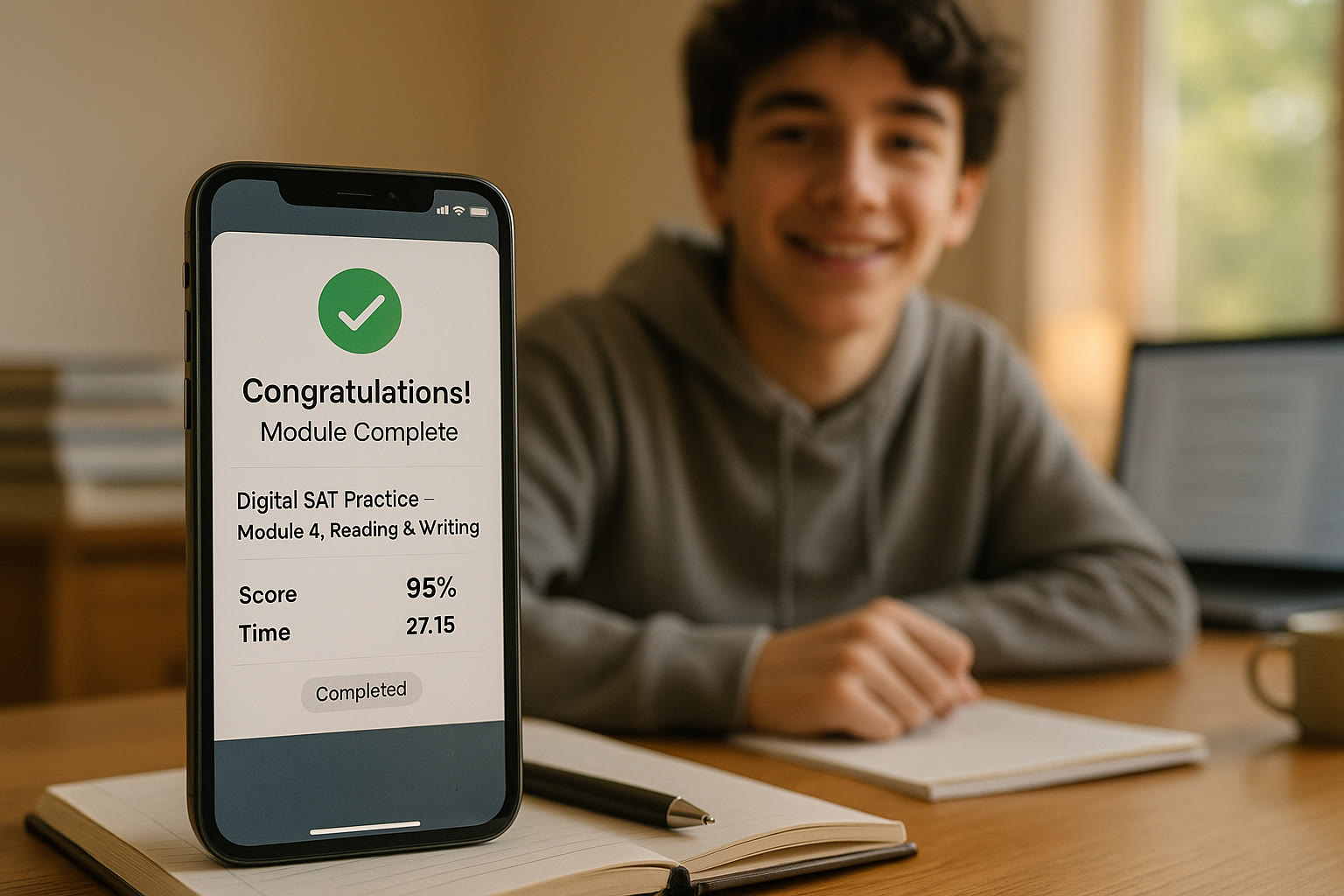Why Celebrating Small Progress Matters in SAT Prep
When your teen opens a practice test, completes a timed section, or finally masters a tricky algebra concept, those moments can look small on the calendar — but they’re huge for confidence. The SAT (now in a digital format for most students) is a marathon made of many tiny steps: practice questions, review sessions, target-setting, and retakes. Recognizing incremental progress fuels motivation more reliably than waiting for a big, dramatic score jump.
Celebration doesn’t have to be grandiose. Thoughtful, timely recognition shows the student that effort — the daily grind of practice and learning — is seen and valued. It teaches them to anchor self-worth to growth and resilience, not just end results.

How to Congratulate So It Actually Helps
1. Be Specific
“Good job” is nice, but specificity turns praise into guidance. Mention exactly what improved — for example, “I noticed you finished those 20 math problems without getting stuck on quadratic questions.” That highlights the behavior you want to repeat.
2. Focus on Effort and Strategy, Not Labels
Say “You stuck with that timed section even though it was hard” instead of “You’re so smart.” Effort-based praise helps teens develop a growth mindset; it tells them that persistence and good study strategies are what create change.
3. Match Tone to Teen’s Personality
Some teens love public recognition; others shut down. Keep the moment private if they prefer. Ask what kind of feedback they appreciate — this small step models respectful communication and shows you trust their perspective.
4. Use Timing Wisely
Congratulate promptly — within hours or the same day of the win. Immediate feedback links the action to the positive feeling, making it more likely they’ll repeat it.
Simple Scripts You Can Use — Natural, Warm, and Short
Here are ready-to-use phrases organized by context. Use them as-is or tweak the tone to match your teen.
After Finishing a Difficult Practice Section
- “I saw you finish that Reading section without stopping to re-read every paragraph — that’s progress. Nice work.”
- “You kept the pace even when questions got tricky. That focus will pay off on test day.”
When They Improve a Topic (e.g., algebra, grammar rules)
- “You used that new method for quadratic equations — it worked. I’m proud of how you tried something different.”
- “You remembered the comma rule in the practice essay. That attention to detail is getting stronger.”
For Consistent Small Steps (daily practice, study streaks)
- “Three days in a row — that streak matters more than a single test. Keep that momentum.”
- “You set a 30-minute goal and hit it. Small habits make big results.”
When They Bounce Back After a Tough Result
- “You reviewed the practice test and adjusted your strategy — that’s maturity. Well done.”
- “It was frustrating, but you took notes on what went wrong. That’s exactly how progress happens.”
Longer Scripts and Notes for Conversations
Sometimes a quick phrase isn’t enough. Here are longer scripts to use in a conversation — they combine recognition, encouragement, and a next step.
Script: The Encouraging Debrief
“I noticed you spent an hour tonight working through the math practice and then went back to rework the questions you missed. That’s exactly the kind of approach that builds real skill. Want to tell me which problem surprised you the most? We can walk through it together or I can help you set a one-step plan to practice similar problems tomorrow.”
Script: The Confidence Builder
“You improved your pacing today — finishing that section with time to spare. That tells me your timing strategy is improving, and that’s huge. I’m proud of how you adjusted. Let’s celebrate the win and then pick one small timing drill for tomorrow to keep the momentum.”
Script: The Coach’s Nudge
“You tried a new study approach this week and it seemed to help. That experimentation is exactly what builds progress — you’re learning how you learn. How would you feel about trying that method three more times this week so we can see a pattern?”
Practical Examples: Make It Real
Below are realistic, short exchanges between parents and teens to illustrate tone and timing. These scripts are practical — not scripted theatre — so keep your language natural.
Example 1 — After a timed practice section
Parent: “Hey, I saw your Bluebook practice time — you shaved three minutes off your last run. That’s progress. Want to grab a snack and tell me which question you’d redo?”
Example 2 — After solving a tough concept
Parent: “You got that grammar pattern right twice in a row — love to see it. You should be proud. Do you want to note those rules in a two-line cheat sheet?”
Example 3 — After returning to study following low motivation
Parent: “You sat down this evening even though you said you were tired — that’s resilience. Let me know if a shorter session or a change of scenery helps next time.”
How to Pair Praise with Practical Next Steps
Praise is most powerful when tied to an actionable next step. That helps convert a warm feeling into a learning habit. Here are short templates you can attach after a congratulatory line:
- “Nice job — want to pick one similar problem for tomorrow?”
- “Great focus — could you try the same timing drill two more times this week?”
- “You handled that difficult passage well — would you like to write a 5-minute summary to lock it in?”
When to Use Rewards — And When Not To
Rewards can be motivating, but they should be used thoughtfully. Tangible rewards (a favorite dinner, a small treat) are great for marking milestones. Avoid creating the sense that effort only counts if there’s material payoff.
- Use rewards for sustained behaviors (e.g., a full study week, improved practice test consistency).
- Keep most praise verbal and specific — it lasts longer than a one-off gift.
- Let the teen help design rewards when appropriate — it builds agency.
Timing and Frequency: Don’t Overdo It
Too much praise can feel hollow. Instead, prioritize meaningful moments: when a strategy is adopted, when a bad habit is broken, or when persistence shines through. Aim for a balance: regular, honest feedback that’s tied to outcomes or observable behavior.
Table: Examples of Small Wins, Appropriate Praise, and a Natural Next Step
| Small Win | What to Say (Short) | Natural Next Step |
|---|---|---|
| Finished a timed Reading section | “Nice pacing — you finished with time to review.” | Do one accuracy check on the toughest 3 questions. |
| Reduced careless math errors | “Your attention to detail is improving — great catch.” | Make a two-line checklist for common errors. |
| Studied 30 minutes consistently for five days | “That streak shows discipline.” | Plan a slightly longer session this weekend to build stamina. |
| Mastered a grammar rule | “You nailed that rule twice — excellent.” | Create a flashcard and review it twice this week. |
Practical Tips for Parents — Shortcuts That Keep Praise Real
- Keep a small notebook of wins. Jot down two or three specific things each week to reference during conversations.
- Use a consistent phrase the teen recognizes as meaningful — it can become a positive ritual.
- Model balanced reactions. Show that you value effort and learning even when outcomes lag.
- If the teen is anxious about scores, separate praise for effort from score discussions; empathy about emotions first, then problem-solving.
When to Bring in Extra Support — Gentle Guidance
Sometimes steady progress stalls despite effort. That’s a natural time to consider added support. Personalized tutoring — like Sparkl’s tailored 1-on-1 guidance — can offer targeted strategies and focused practice. Tutors can identify patterns in digital SAT practice runs, suggest efficient drills, and build a study plan that fits the student’s strengths and schedule. When used thoughtfully, expert tutoring becomes another form of celebration: it’s an investment in future wins.
Scripts for Different Relationships: Coaches, Teachers, and Siblings
Not all voices are the same. A teacher or coach might focus on academic language and next-step strategy, while a sibling might use humor or shared experience. Here are quick variations so the message feels authentic to the sender.
Teacher/Coach
“Your strategy for reading longer passages is improving — your notes are clearer and your answers are more accurate. Keep using that annotation method for the next two practice sets.”
Sibling
“You beat your time again — are you secretly a test ninja? Seriously, great work. Want me to quiz you on vocab tomorrow?”
Friend/Study Partner
“That last math set was brutal, but you destroyed it. Team study sesh tonight?”
Examples That Avoid Pitfalls — Words to Steer Clear Of
Avoid praise that:
- Implies fixed ability only (e.g., “You’re just naturally smart”).
- Compares to others (e.g., “You did better than your classmates”).
- Overpromises (e.g., “This guarantees a 100-point jump”).
Instead, keep language focused on behavior, choice, and the process of learning.
How to Use Technology to Reinforce Praise
With the SAT’s digital practice environment, you can use small digital rituals: a supportive text right after practice, a shared calendar event celebrating a study milestone, or a short voice note highlighting what you noticed. If your teen uses a platform that tracks practice, celebrate improvements it shows — for example, improved timing, fewer careless errors, or a streak on practice apps.

Final Thought: Small Celebrations Build Big Confidence
Preparing for the Digital SAT is not just about hitting a number — it’s a learning journey where small wins are the reliable signposts of real change. Thoughtful encouragement helps teens see those signposts and keep moving forward. When parents and mentors notice effort, celebrate strategy, and offer gentle next steps, they give teens something more valuable than a single test score: the skill and confidence to learn and improve.
If you ever feel stuck on how to support practice effectively, consider blending home encouragement with targeted help. Personalized 1-on-1 tutoring and tailored study plans (like those offered by Sparkl) can complement the everyday praise you give, turning small wins into lasting progress.
Quick Reference: One-Page Script Cheatsheet to Keep Handy
Copy this short cheatsheet and keep it on the fridge or your phone for moments when you want to say something supportive but don’t know what:
- Spot the win: “I noticed you…”
- Praise the effort: “Great persistence/strategy/focus.”
- Offer a small next step: “Want to try…?”
- Close with support: “I’m proud of how you’re working on this.”
Using this structure, even a two-sentence response becomes growth-focused, sincere, and motivating.
Parting Note
Teens preparing for college are juggling school, extracurriculars, and so much more. Celebrate the small moments — the five extra minutes of practice, the correct explanation of a grammar rule, the consistent study streak. Those small moments add up, and your recognition of them matters. Keep the tone warm, specific, and constructive, and you’ll help your teen develop the habits and confidence that last far beyond the test.
Now take one small step: pick one script from this post and use it the next time you see progress. You’ll be surprised how much that little acknowledgment can brighten a study session and build momentum.













No Comments
Leave a comment Cancel